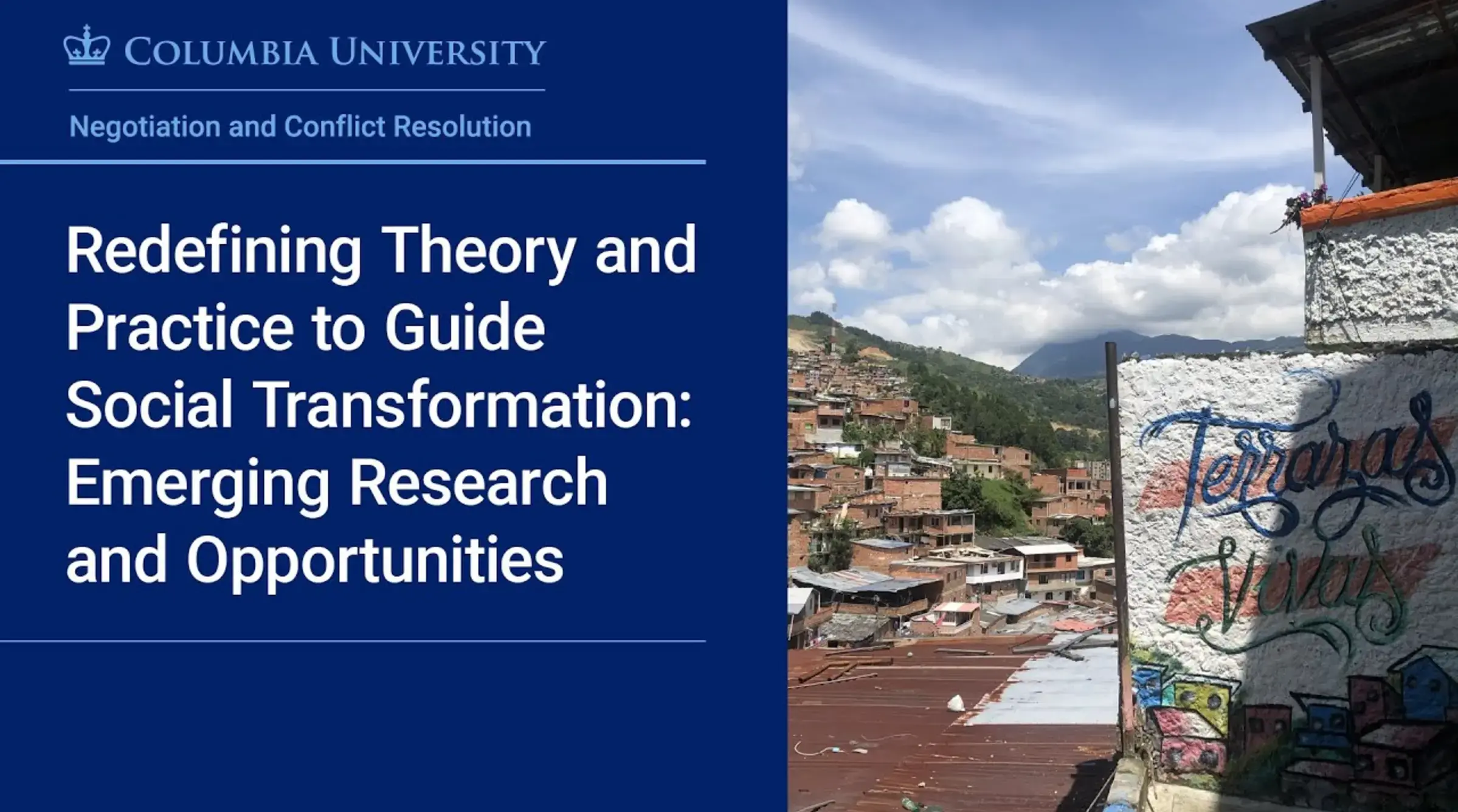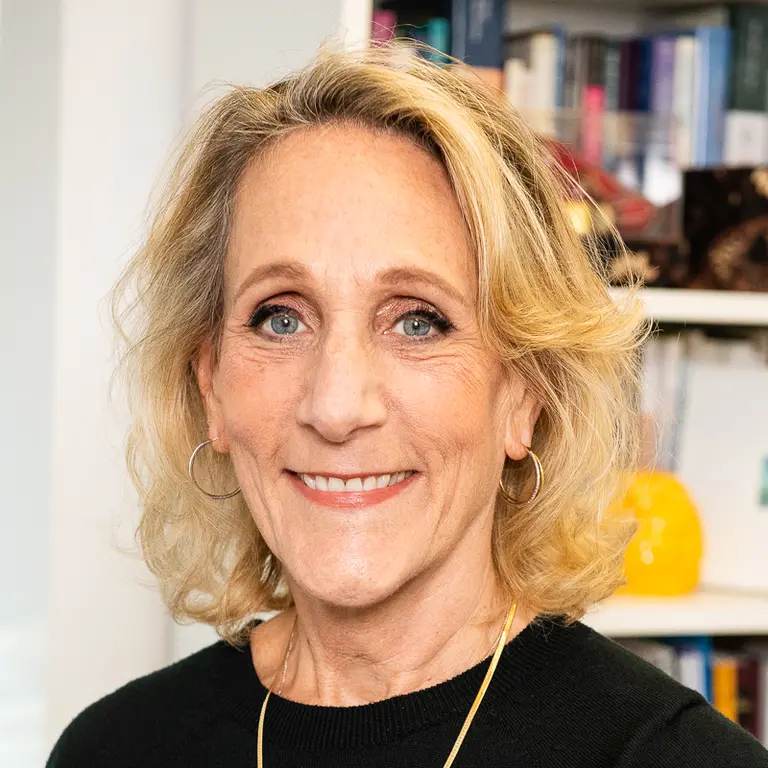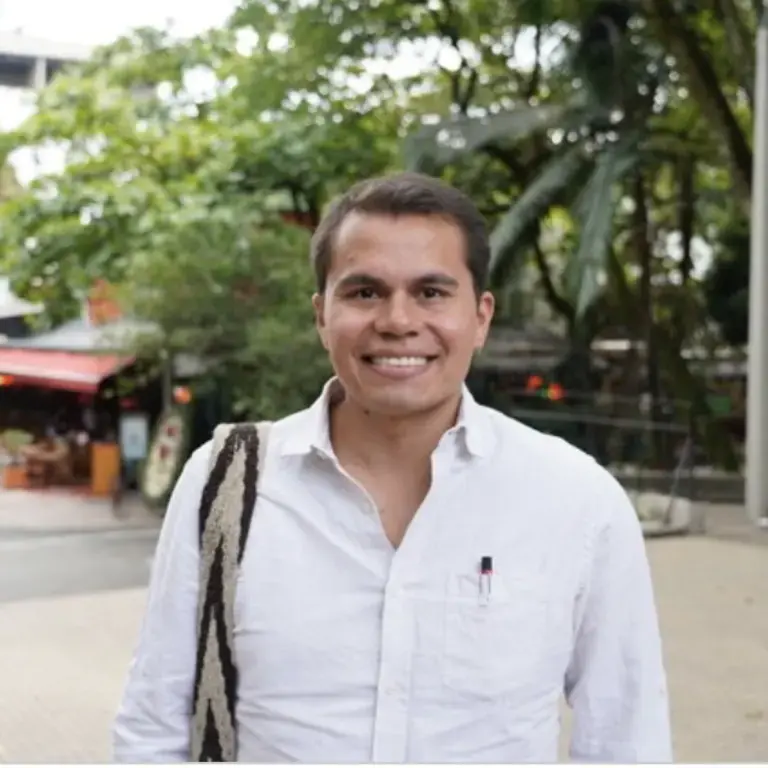Redefining Theory and Practice to Guide Social Transformation
Spanish subtitles for this video (above) are available by clicking the closed caption icon and selecting "Spanish" in settings.
You are cordially invited to celebrate the launch of Dr. Beth Fisher-Yoshida and Joan C. Lopez’s forthcoming book, Redefining Theory and Practice to Guide Social Transformation: Emerging Research and Opportunities, published by IGI Global.
Join us for a 90-minute program that will feature music, art, and reflections from the authors, as well as videos that the co-authors of several chapters pre-recorded for this special event. The featured co-authors are either current or former Youth Leaders in Medellin, Colombia with whom Dr. Beth Fisher-Yoshida and Joan C. Lopez applied the conflict transformation methods described in the book. Following the program, there will be time for audience Q&A.
This event culminates several events and articles that have launched Redefining Theory and Practice to Guide Social Transformation: Emerging Research and Opportunities. Watch "Building Relationships and Rapport is a Long Process of Negotiation" as well as a conversation between the co-authors that took place in November, and read the announcement of the book from October.
About the Authors
Beth Fisher-Yoshida, Ph.D.
Academic Director; Professor of Practice; Vice Chair of Faculty
As Professor of Professional Practice, Beth Fisher-Yoshida, Ph.D. teaches classes in negotiation, conflict resolution, and conflict analysis. Her approach to learning is based on her core belief that when we improve communication by developing more self-awareness, we will have better relationships and improved negotiation practices.
Dr. Fisher-Yoshida is Co-Executive Director of the Advanced Consortium on Cooperation, Conflict and Complexity (AC4) and Director of the Youth, Peace and Security (YPS) program, both housed in the Earth Institute at Columbia University. In her role at YPS she has been working to develop systemic approaches to building more effective communities through youth leadership in Medellín, Colombia, using a Social Lab approach.
Dr. Fisher-Yoshida partners with clients to develop customized interventions aimed at improving organizational performance. She is able to blend the best of both worlds: the knowledge from academia with effective practices to apply successfully to real life situations. Her firm, Fisher Yoshida International, focuses on leading organizations through change by improving communication and creating shared goals and practices to align with the organization’s mission and vision. She works globally with clients and speaks conversational Japanese having lived and worked in Japan for 13 years.
Dr. Fisher-Yoshida is the author of numerous articles, chapters, edited books, and authored a book on transnational leadership. She has a new book to be released soon on women and negotiation. Her main areas of focus are Coordinated Management of Meaning (CMM), negotiation, intercultural communication, conflict resolution and transformative learning.
As Vice Chair of the Faculty of Professional Studies, Dr. Fisher-Yoshida collaborates with the Chair of Faculty and Senior Associate Dean of Academic Affairs to coordinate and manage the School’s academic governance committees—specifically, the Academic Excellence Committee, Admissions Committee, Chair’s Committee, Resource Allocation Committee, and Reputation, Relationship, and Development Committee.
Dr. Fisher-Yoshida is also a Certified Clinical Sociologist (CCS).
Joan Camilo Lopez
Youth, Peace, and Security Program Manager
Joan is the Program Manager of the Youth, Peace, and Security Program at the Earth Institute's Advanced Consortium on Cooperation, Conflict, and Complexity. His work is situated in the threshold where sociopolitical processes led by youth community leaders meet with the production of spaces of peace in areas where violent conflicts are rampant. He focuses on understanding the ways youth leaders make sense of violent conflicts, and on how they construct practices and technologies to respond peacefully to the dynamics of such conflicts. He is also interested on how the concrete practices and technologies designed by community youth leaders can inform and further develop academic approaches to peacebuilding, conflict resolution, and leadership; and on how the work of youth leaders can benefit from applying some of the practices and theories that are produced in academia. In short, his work lays where theory and praxis melt. Part of his work at AC4 looks to develop qualitative and quantitative methods to monitor and evaluate the impact of the work led by the youth community leaders with whom we work. In addition to his work at AC4, he is also an adjunct professor of cultural anthropology at City College and Lehman College, CUNY.
About Redefining Theory and Practice to Guide Social Transformation: Emerging Research and Opportunities
The application of theory to practice in addressing social transformation still has a lot of room for growth and improvement. This is also true of theory being informed by practice. Too often, there are gaps between what is studied in the academy and what is needed in the field. The academy develops theories in isolation from the everyday lives of people, especially in post-conflict environments. Communities seeking innovative ways to address their social needs can benefit from the learning of theories and research conducted within academia. At the same time, these methods need to be relevant to the local contexts within which they are being used. While there are certain norms of communication in the academy of how research is conducted and disseminated, there needs to be a translation into practical terms to be used in the field.
Redefining Theory and Practice to Guide Social Transformation: Emerging Research and Opportunities addresses the need practitioners and social change agents have in finding processes and practices to use in the field to engage with and transform communities. This critical reference book provides an innovative fieldwork method that leads to social transformation and suggests ways to further develop the relationship between academic theories and practices around social conflicts with the existing local knowledge. The chapters include mini case studies that have been developed over the years from the authors’ work with youth and community leaders with the objective of providing a methodology that allows practitioners to approach the field by engaging with local actors in ways that are generative and trustworthy, yet rigorous. While highlighting the practices, notions, and technologies that are at work in conflict, post-conflict, or transitioning out of conflict settings by local community leaders, this book is ideally for practitioners in the field of conflict, peacebuilding, and social and conflict transformation; community leaders and social organizers; as well as practitioners, stakeholders, researchers, academicians, and students interested in social transformation.
For questions, please contact Kjerstin E. Pugh, kep2137 [[at]] columbia [[dot]] edu.
For additional information about program offerings at Columbia University’s School of Professional Studies, please contact an Admissions Counselor at 212-854-9666 or inquire [[at]] sps [[dot]] columbia [[dot]] edu.


